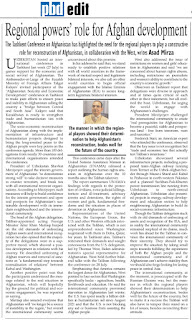http://www.scoopnews.in/det.aspx?q=115685
https://qoshe.com/kashmir-images/asad-mirza/role-of-regional-powers-for-afghanistan-s-development/143547604
http://www.kipnews.in/newsdet.aspx?q=18361
https://thekashmirimages.com/2022/08/02/role-of-regional-powers-for-afghanistans-development/
https://mediaswaraj.com/role-of-regional-powers-for-afghanistans-development/
Role of Regional Powers for Afghanistan’s Development
The Tashkent Conference on Afghanistan has highlighted the need for
the regional players to play a constructive role for reconstruction of Afghanistan,
in collaboration with the West.
Tashkent Conference
Uzbekistan hosted an international conference in Tashkent last week
(27 July) to garner support for the economic and social revival of Afghanistan.
The Ambassador-at-Large of the Kazakh Ministry of Foreign Affairs Talgat
Kaliyev invited participants of the “Afghanistan: Security and Economic
Development” conference in Tashkent to make joint efforts to ensure peace and
stability in Afghanistan calling the country a “bridge between Central and South
Asia”. Kaliyev said that Kazakhstan is ready to strengthen trade and
humanitarian ties with Afghanistan.
The socio-economic reconstruction of Afghanistan along with the
implementation of infrastructure and humanitarian projects designed to bring
the long-awaited peace to the Afghan people were key points on the conference
agenda. More than 100 delegations from nearly 30 countries and international organisations
attended the conference.
President of Uzbekistan Shavkat Mirziyoyev urged the interim
government of Afghanistan “to demonstrate strong will” to take decisive
measures to counter terrorism, and break ties with all international terrorist
organisations. According to Mirziyoyev, such measures will help to build
confidence for the interim government and open real prospects for Afghanistan’s
sustainable development with its immediate neighbourhood and the international
community.
IEA’s stand
The head of the Afghan delegation, Taliban-appointed acting Foreign
Minister Amir Khan Muttaqi harped on the old demands of unfreezing Afghan
assets and international recognition but also opined that the majority of the
delegations were in a supportive mood, which showed a positive development in relations
with his country. He described unfreezing of Afghan reserves and removal of
sanctions as “a fundamental step towards normalisation of relations” between
Kabul and Washington.
Another positive point was that the participants understood the
message related to the real situation in Afghanistan, which will hopefully lay
the ground for political and economic engagement, he was reported as saying.
Muttaqi also assured everyone that Afghanistan will “no longer be a
source of instability in the region,” but overall the international community
seems unconvinced about this promise.
In his address he said that, we stand ready to establish positive
relations with all world countries in the framework of mutual respect and
legitimate bilateral interests, we also call on other world countries to begin
official engagement with the Islamic Emirate of Afghanistan (IEA) to secure
long-term legitimate bilateral interests.
This conference came days after the United Nations Assistance
Mission in Afghanistan (UNAMA) released a report outlining the human rights
situation in Afghanistan over the 10 months since the Taliban takeover.
The report summarises UNAMA’s findings with regards to the
protection of civilians, extra-judicial killings, torture and ill-treatment,
arbitrary arrests and detentions, the rights of women and girls, fundamental
freedoms and the situation in places of detention in Afghanistan. The report
also contained recommendations to both the de facto authorities and the
international community.
Despite an overall, significant reduction in armed violence, between
mid-August 2021 and mid-June 2022, UNAMA recorded 2106 civilian casualties (700
killed, 1406 wounded).
U.S.A.’s Approach
Representatives of the United Nations, the European Union, the U.S.
and other Western officials interacted with the Taliban, which is not
unprecedented since Washington negotiated with them in Doha, Qatar, for years. In
Tashkent also, Taliban’s reiterated their demands and sought concessions from
the U.S. delegation, led by Thomas West, Biden administration’s special
representative for Afghanistan. West held further bilateral talks with the
Taliban following the conference on 28 July.
Emphasising that America remains the largest donor for Afghanistan,
West pointed to four sectors that Washington specifically backs – agriculture,
health, livelihoods and education. He said the international community
prevented starvation in Afghanistan last winter; the U.S. spent nearly a
billion dollars in humanitarian aid since August 2021 and that the U.S. is not
blocking any aid or business from assisting the Afghan people.
West also addressed the issue of restrictions on women and girls’
education in Afghanistan and said “we are concerned about human rights abuses,
including restrictions on journalists and women’s ability to contribute to the
country’s economic growth.”
Observers in Tashkent report that delegations were diverse in
approach and at times quite critical of each other in their statements, but all
credited the host, Uzbekistan, for urging the world to engage with
Afghanistan’s challenges.
President Mirziyoyev challenged the international community to
create “real prerequisites for Afghanistan to become a peaceful, stable and
prosperous land - free from terrorism, wars and narcotics.”
Frederick Starr, an American expert who attended the conference,
observed that the key issue is not recognition but "trade and economic
ties that actually test Taliban’s intentions."
Uzbekistan showcased several infrastructure projects, including a
proposed trans-Afghan railway running from Termez at the Uzbek-Afghan border
through Mazar-i Sharif and Kabul to Peshawar in north-western Pakistan and a
planned Surkhan-Puli-Khumri power transmission line running from Uzbekistan to
north-central Afghanistan. Uzbekistan also presented projects in energy,
railway development and education sectors to help neighbouring Afghanistan to
build its social-economic infrastructure.
Though the Taliban delegation stuck with its old demands of
unfreezing of assets and recognition of the IEA, and in reality the
international community remained sceptical of its claims, much work lies ahead
for the Taliban to convince the international community of their sincerity.
They should try to improve the situation by taking small steps towards
fulfilling the aspirations of both the Afghan people and the international
community, and if Afghanistan can’t achieve stability then we should also
forego looking for lasting peace in central Asia.
The international community, at the moment, is preoccupied with the
Russian-Ukraine war, but the manner in which the regional players showed their
determination to help Afghanistan’s reconstruction, bodes well for the future
of the country, but to make it a success the Taliban will also have to temper
their stand on a lot of issues, besides reconciling their attitude.

.jpeg)



Comments
Post a Comment